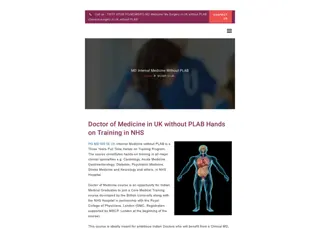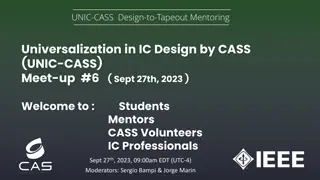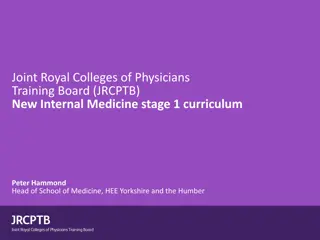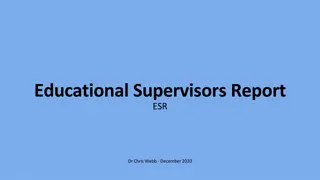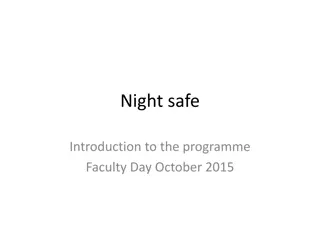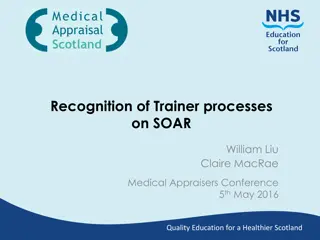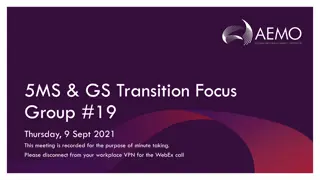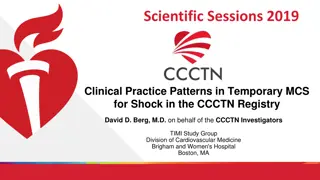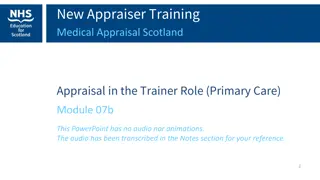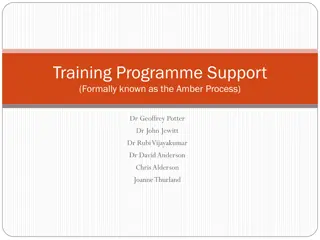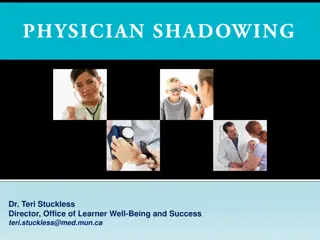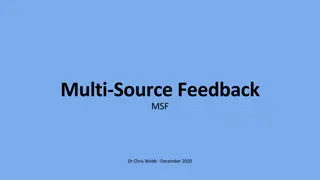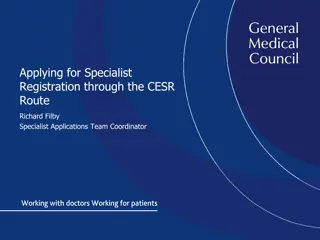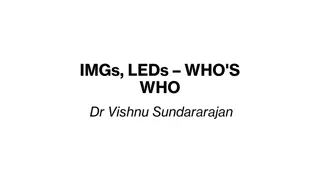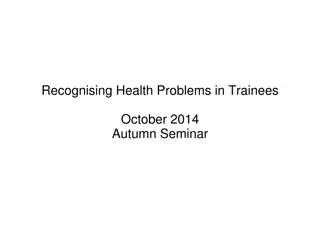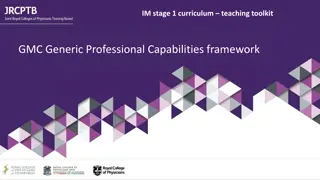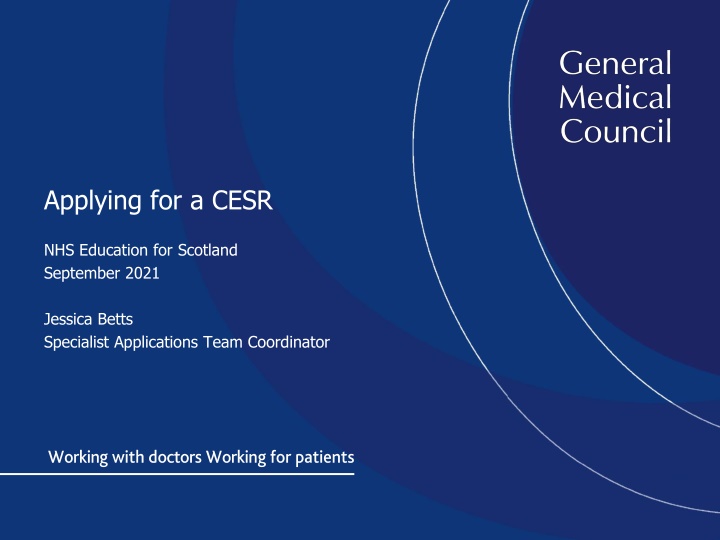
CESR Application Guide for Medical Professionals
Learn about the Certificate of Eligibility for Specialist Registration (CESR) process, eligibility criteria, specialties, and how to apply. Discover the role of the Specialist Applications Team and gain insight into the application fee and timelines.
Download Presentation

Please find below an Image/Link to download the presentation.
The content on the website is provided AS IS for your information and personal use only. It may not be sold, licensed, or shared on other websites without obtaining consent from the author. If you encounter any issues during the download, it is possible that the publisher has removed the file from their server.
You are allowed to download the files provided on this website for personal or commercial use, subject to the condition that they are used lawfully. All files are the property of their respective owners.
The content on the website is provided AS IS for your information and personal use only. It may not be sold, licensed, or shared on other websites without obtaining consent from the author.
E N D
Presentation Transcript
Applying for a CESR NHS Education for Scotland September 2021 Jessica Betts Specialist Applications Team Coordinator
What do the Specialist Applications Team do? Manage all applications for entry onto the Specialist or GP Register Verifications and duplicates of certificates issued by GMC and predecessors Coordinate GMC s response to appeals against Specialist or GP Registration Applications for Out of Programme (OOP) approval
Whats a CESR? Entry onto the Specialist Register with a Certificate of Eligibility for Specialist Registration (CESR) Route for doctors who haven t followed full training programme in the UK Assessed against standards of the UK CCT curriculum Evidence based application process CESR is not An assessment of competency in your current role Based solely on recommendations from colleagues
CESRs received by specialty 0%0%0% 2% 3% Surgical 4% Physician 3% Radiology 28% O&G 6% Paediatrics Anaesthetics Psychiatry 9% Ophthalmology Emergency medicine GP 6% Pathology CSRH Occupational medicine 10% 22% Public health medicine 7%
How am I eligible for a CESR? To be eligible in a CCT specialty, you must have either: A specialist medical qualification in the specialty you are applying or At least 6 months continuous training in the specialty you are applying From any point in your career and anywhere in the world Provide documentary evidence of your eligibility
How am I eligible for a CESR? To be eligible in a non-CCT specialty, you must have either: A specialist medical qualification in ANY non-CCT specialty or At least 6 months continuous training in ANY non-CCT specialty From any point in your career but must be from OUTSIDE THE UK Provide documentary evidence of your eligibility
How do I apply for a CESR? Once you ve started an application, you must submit it within 12 months Current CESR fee: 1676
Authentication & Verification Authentication by solicitor or awarding body Only qualifications / registration with regulators outside UK Verification by medical supervisors Required for majority of documents to confirm evidence is true & accurate record Incorrectly verified / authenticated evidence won t be sent to Royal College for assessment
How do I authenticate my evidence? Only registration or qualifications from outside UK Authenticated by solicitor / awarding body Stamp & sign a copy, certifying they ve seen the original AKA certified copy
How do I get my evidence verified? 1. Identify a verifier from each institution Verifier 2. Complete the proforma Proforma 3. Verifier to checks your evidence Review 4. Submit proformas with application evidence Submit 5. GMC conducts primary source verification (PSV) PSV
Evidence - Anonymisation All patient identifiable information must be removed Trainees who ve been assessed and colleagues named in a complaint must also be removed Some details can remain e.g. gender, date of birth
How do I submit electronic evidence? Evidence uploaded for each section of the application Applications Advisers can share guidance electronically Faster, cheaper, and more secure What can I upload? .pdf .doc .ppt .xls We recommend that you upload your evidence in PDF format
How should I present my electronic evidence? Different types of evidence should be grouped together e.g. WPBAs Give each grouping an appropriate title Don t group more than maximum 10 pieces of evidence which require anonymization
How should I title my evidence? Each document you upload should have an appropriate title The title of your document should be the same on your application form and relevant pro forma Using our suggested naming conventions will help us to process your application quicker
Before you apply Read the specialty specific guidance (SSG) and curriculum for your specialty Don t duplicate evidence Make sure your evidence is relevant Bear in mind that CESR applications are typically 800-1200 pages Make sure all your evidence is anonymised
CESR stage 1 initial assessment Application received Hardcopy evidence received Initial assessment 5 days 14 days Eligibility check Request structured reports Contact verifiers
Structured Reports Minimum of 4 referees Structured reports used to triangulate your primary evidence Referees must be able to comment on your current/recent competence and breadth of your practice 2 referees should work in your specialty First referee must be your current clinical / medical director
CESR stage 2 evidence review Additional evidence deadline Adviser reviews evidence Issues checklist 30 days 60 days Application adviser reviews evidence Guidance provided on how application could be strengthened 60 days to submit additional evidence
Strong evidence What is strong evidence and why do I need it? Demonstrates how you ve met a curriculum competency Clear, relevant and current Triangulated with other documents to show competence in full Can cover multiple areas of the curriculum What is triangulation? E.G. Teaching and training section of the application Very easy, but requires organisation and familiarisation with the curriculum and SSG!
Primary and secondary evidence Submit a mix of primary and secondary evidence More weight given to primary evidence Secondary Primary
CESR stage 3 evaluation of your application Application prepared for evaluation & sent to RCF Evaluation returned from RCF GMC quality assures evaluation & issues decision Application closed 15 days 49 days 41 days three month legal deadline Royal College provide specialist assessment Two independent evaluators GMC undertake a quality assurance review GMC issues decision based on the RCF recommendation
Success rates 120% 100% 80% 43% 43% 46% 46% 47% 51% 53% Refused 60% Granted 40% 57% 57% 54% 54% 53% 49% 47% 20% 0% 2014 2015 2016 2017 2018 2019 2020
Why are applications unsuccessful? No evidence demonstrating level of competence / performance (WPBAs) No pass in the standard test of knowledge within the curriculum or demonstrated equivalent Insufficient evidence of audits particularly closing the loop Lack of research evidence Specialisation in one area of the curriculum Lack of management / leadership experience
What if Im unsuccessful? Provided with a series of recommendations for future applications Two options: Review Apply on basis of additional evidence or if you feel there s been a procedural error Must apply within 12 months Only provide evidence to meet recommendations 728 Appeal Decision made by the GMC not to include you on SR 1,668 - 2,522
Review application Success Rates 120% 100% 70% 83% 87% 86% 90% 92% 96% 80% Granted Refused 60% 40% 30% 20% 17% 14% 13% 10% 8% 0% 4% 2020 2014 2015 2016 2017 2018 2019
The future of CESR New standards for curricula development launched in 2017 All RCFs must update their curricula to incorporate Generic Professional Capabilities (GPCs) by the end of 2020 extended to end 2022 due to COVID-19 Applicants to be given option to apply in old or new (GPC) curriculum Incorporating GPCs will change the structured of the curricula; thus structure of CESR If you ve started an application, we ll keep you updated on the progress of curriculum development in your specialty and your options for CESR
Coronavirus (COVID-19): impact on CESR Application process continued to run as normal throughout course of the pandemic Specialist Applications Team working from home GMC Manchester & London offices closed, so we re unable to accept hardcopy evidence Experiencing delays due to impact of the pandemic & high volumes of applications
Contacting us 0161 923 6602 equivalence@gmc-uk.org www.gmc-uk.org


